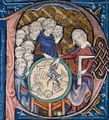Difference between revisions of "File:Woman teaching geometry.jpg"
From Wicri pool V1.31 Démo.Istex
| Line 5: | Line 5: | ||
{{en|Detail of a scene in the bowl of the letter 'P' with a woman with a set-square and dividers; using a compass to measure distances on a diagram. In her left hand she holds a square, an implement for testing or drawing right angles. She is watched by a group of students. In the Middle Ages, it is unusual to see women represented as teachers, in particular when the students appear to be monks. She is most likely the personification of Geometry, based on Martianus Capella's famous book ''De Nuptiis Philologiae et Mercurii,'' [5th c.] a standard source for allegorical imagery of the seven liberal arts. | {{en|Detail of a scene in the bowl of the letter 'P' with a woman with a set-square and dividers; using a compass to measure distances on a diagram. In her left hand she holds a square, an implement for testing or drawing right angles. She is watched by a group of students. In the Middle Ages, it is unusual to see women represented as teachers, in particular when the students appear to be monks. She is most likely the personification of Geometry, based on Martianus Capella's famous book ''De Nuptiis Philologiae et Mercurii,'' [5th c.] a standard source for allegorical imagery of the seven liberal arts. | ||
Illustration at the beginning of Euclid's Elementa, in the translation attributed to Adelard of Bath.}} | Illustration at the beginning of Euclid's Elementa, in the translation attributed to Adelard of Bath.}} | ||
| − | {{fr|Détail d'une enluminure du XIVe siècle, contrepoinçon d'une lettre capitale P, au début des Éléments d'Euclide, dans une traduction attribuée à Adélar de Bath. Une femme porte une équerre d'une main et utilise un compas de l'autre pour mesurer des distances sur un diagramme. Un groupe de moines, apparemment ses étudiants, la regardent. Au Moyen Âge, la représentation d'une femme dans un rôle d'enseignant est inhabituelle. La femme représentée ici serait donc plutôt une personnification de la géométrie.}} | + | {{fr text|Détail d'une enluminure du XIVe siècle, contrepoinçon d'une lettre capitale P, au début des Éléments d'Euclide, dans une traduction attribuée à Adélar de Bath. Une femme porte une équerre d'une main et utilise un compas de l'autre pour mesurer des distances sur un diagramme. Un groupe de moines, apparemment ses étudiants, la regardent. Au Moyen Âge, la représentation d'une femme dans un rôle d'enseignant est inhabituelle. La femme représentée ici serait donc plutôt une personnification de la géométrie.}} |
|institution={{institution:British Library}} | |institution={{institution:British Library}} | ||
|accession number=BL Burney 275, f. 293 r. | |accession number=BL Burney 275, f. 293 r. | ||
Revision as of 19:45, 3 March 2019
Summary
| Artiste | Template:Creator:Meliacin Master |
| ⧼wm-license-information-description⧽ |
English: Detail of a scene in the bowl of the letter 'P' with a woman with a set-square and dividers; using a compass to measure distances on a diagram. In her left hand she holds a square, an implement for testing or drawing right angles. She is watched by a group of students. In the Middle Ages, it is unusual to see women represented as teachers, in particular when the students appear to be monks. She is most likely the personification of Geometry, based on Martianus Capella's famous book De Nuptiis Philologiae et Mercurii, [5th c.] a standard source for allegorical imagery of the seven liberal arts.
Illustration at the beginning of Euclid's Elementa, in the translation attributed to Adelard of Bath.
français : Détail d'une enluminure du XIVe siècle, contrepoinçon d'une lettre capitale P, au début des Éléments d'Euclide, dans une traduction attribuée à Adélar de Bath. Une femme porte une équerre d'une main et utilise un compas de l'autre pour mesurer des distances sur un diagramme. Un groupe de moines, apparemment ses étudiants, la regardent. Au Moyen Âge, la représentation d'une femme dans un rôle d'enseignant est inhabituelle. La femme représentée ici serait donc plutôt une personnification de la géométrie. |
| Date | Template:Other date |
| ⧼wm-license-artwork-current-location⧽ | Template:Institution:British Library |
| Template:City | |
| Numéro d'inventaire | BL Burney 275, f. 293 r. |
| ⧼wm-license-artwork-source⧽ | Template:British Library image |
| ⧼wm-license-information-permission⧽ (⧼wm-license-information-permission-reusing-text⧽) |
Template:PD-Art-100 |
File history
Click on a date/time to view the file as it appeared at that time.
| Date/Time | Thumbnail | Dimensions | User | Comment | |
|---|---|---|---|---|---|
| current | 13:20, 12 December 2020 |  | 1,039 × 1,148 (758 KB) | Maintenance script (talk | contribs) |
- You cannot overwrite this file.
File usage
There are no pages that link to this file.
Categories:
- File imported from Wikimedia Commons
- History of geometry
- Mathematics lectures in art
- Women of the Middle Ages
- Medieval science
- Medieval education
- P as an initial in illuminated manuscripts
- Illuminated manuscripts in the British Library
- 14th-century illuminated manuscripts
- Gender-role reversals or women in power
- Geometrical tools
- Compasses (drafting) in art
- Personifications of Mathematics
- De Nuptiis Philologiae et Mercurii
- British Library Burney Manuscripts
- Historiated initials from illuminated manuscripts
- Female educators
- Schoolmasters in miniatures
- Meliacin Master
